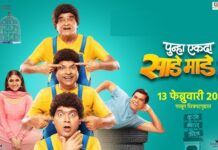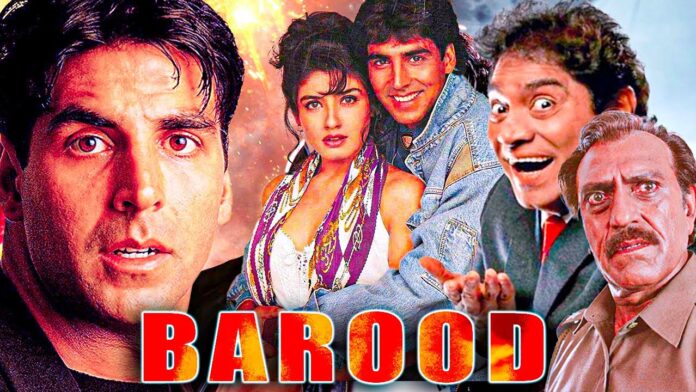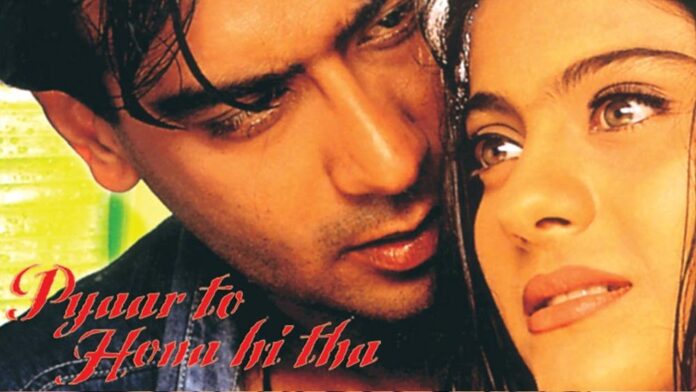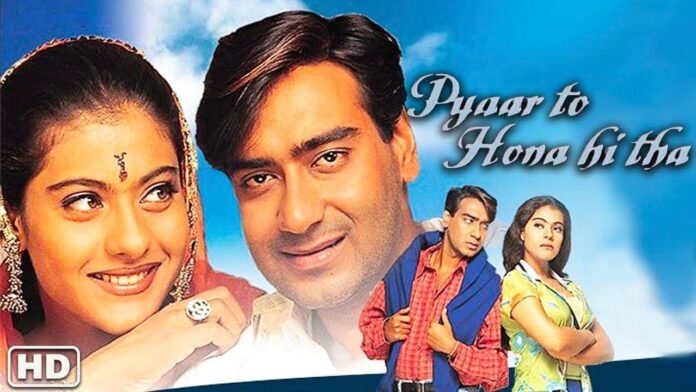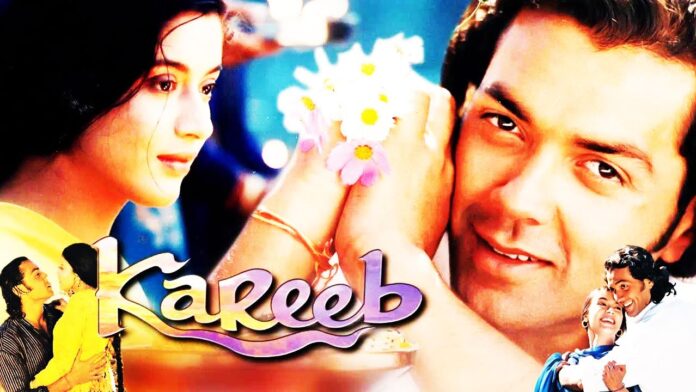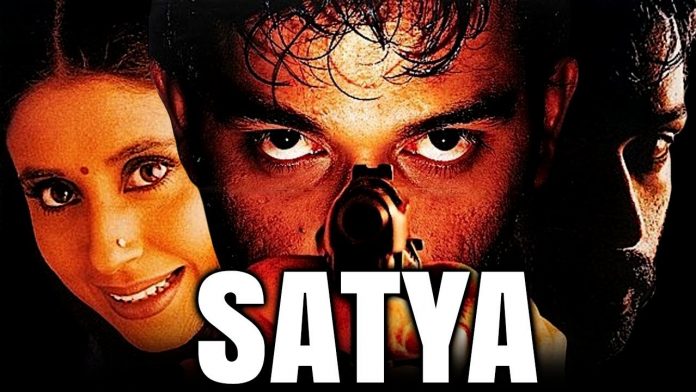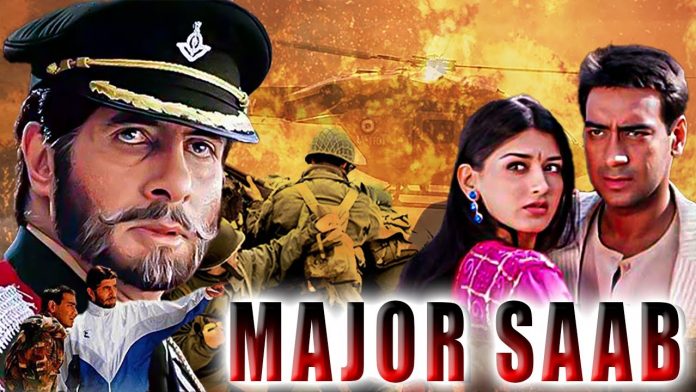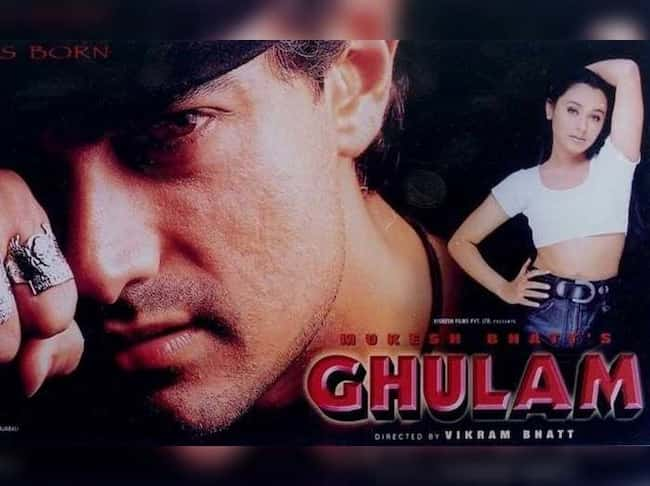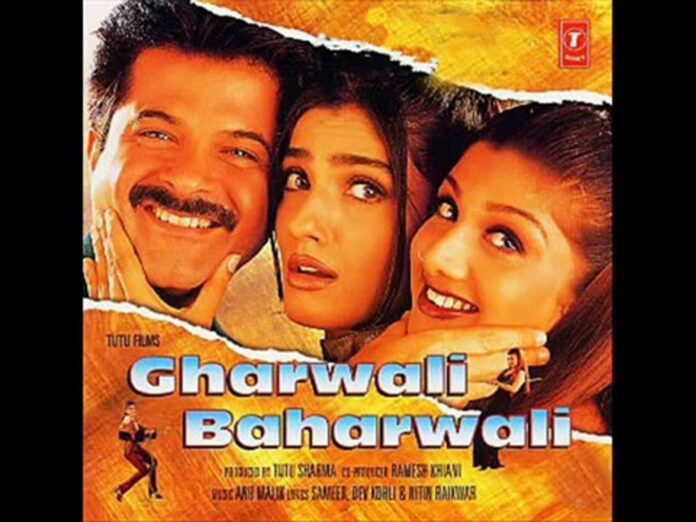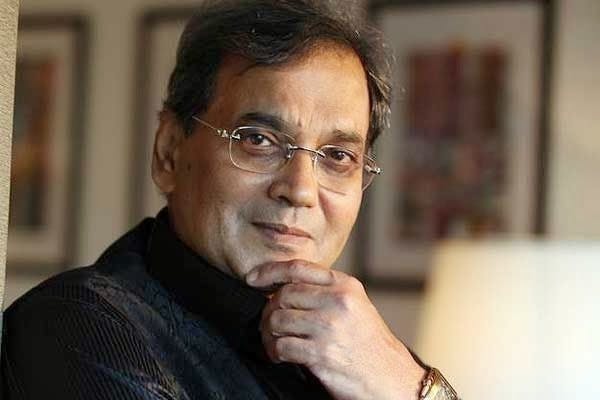BAROOD
Pramod Films’ Barood (UA) is a routine revenge drama made on a lavish scale. A lady vows to avenge the murder of her husband at the hands of a ruthless business tycoon. As luck and coincidence would have it, her foster-son falls in love with the arrogate daughter of this business magnate. Of course, the son tames his beloved but yet, their proposed marriage is met with severe opposition from the businessman. The boy’s mother, however, challenges the girl’s father to stop the wedding. She even keeps aside her quest for revenge, for the sake of the happiness of her foster-son. When the girl’s father targets the boy to kill him, the latter’s mother is injured instead. She is finally killed by the businessman and his group. The boy then destroys the tycoon who is the killer of both, his father and mother.
The story is oft-repeated and reminds of a number of films released in the seventies and eighties. The first half is slow and the drama is interspersed with songs which seem to be too many and quite quick in succession of one another. Although the post-interval portion is lengthy, it is quite good and has some clapworthy and dramatic scenes. In particular, the scene in which Arjun helps the hero to escape from jail and the scene in which Aroona Irani and Gulshan Grover make it possible for the heroine to run away from her home are clap-traps. Climax abounds in action but is too long-drawn out. Dialogues are good at places.
Akshay Kumar excels in stunts and is fair in acting. Raveena Tandon is impressive in dances but does an average job in scenes. Raakhee delivers a good performance. Amrish Puri is efficient as usual. Mohnish is alright. Aroona Irani appeals but she has limited scope. Gulshan Grover plays to the gallery and is truly very good. Mohan Joshi does a fair job. Ayesha Julka appears in a song in which her dance is sexy. Johny Lever, Rana Jung Bahadur, Brij Gopal, Arjun, Shiva, Suresh Chatwal and Deepak Parasher lend average support.
Direction is quite nice but director Pramod Chakravorty has selected a story that cannot let him take much credit for his direction. Anand Milind’s music comprises a couple of reasonably well-tuned songs but there’s not even one number that’s even close to being a hit. In fact, song picturisations are all rich and eye-filling and, considering the money spent on them, their tunes sound lacklustre. Foreign locations and sets (Nitin Desai) are heavenly. Anil Dhanda’s camerawork does full justice in capturing the visual beauty on screen. Action, particularly in the climax, will appeal to the masses. Production values are marvellous. Technically, of a good standard.
On the whole, Barood has gloss and richness but not the substance to match. It will do average business due to a good period and lack of any big oppositions next week.
Released on 7-8-’98 at Minerva and 19 other cinemas of Bombay thru V.I.P. Enterprises. Publicity & opening: very good. …….Also released all over. Opening was good in Gujarat, U.P. and C.I. but ordinary in Delhi and C.P. Berar.
FILM INDUSTRY GEARS UP FOR RALLY ON 18TH AUGUST
About 50 buses as well as a large number of jeeps and cars have been arranged for the participants in the proposed rally of the Bombay film industry on August 18. As is already known, the entire film industry will down shutters for a day to mark its protest against the government’s apathetic attitude towards the menace of video and cable piracy of Hindi films. Moreover, a rally comprising representatives from all sectors of the film industry will begin from Juhu. It will terminate at Azad Maidan after making peaceful demonstrations in front of the offices of Siti Cable and INCable en route. Prominent members of the film industry will deliver speeches at Azad Maidan following which a delegation will hand over a memorandum to Maharashtra chief minister Manohar Joshi, demanding firm and swift action against cable piracy.
A meeting of representatives of all the sectors of the film industry will be held at Mehboob Studios on 9th August at 4 p.m. to chalk out other details of the Bombay industry closure and the rally.
CINEMA FOR SRINAGAR AFTER A DECADE
One cinema reopened in Srinagar yesterday (7th August) with Vinod Chopra’s KAREEB. All cinemas in this Kashmir valley have been closed for almost 10 years now, due to terrorist activities there. The cinema, which opened, is owned by Arjun Amla. It will conduct three shows daily. Vinod Chopra and his heroine, Neha, were present at the opening.
Chief minister Farooq Abdullah, who said at the cinema opening that military security would be provided at the cinema, was hopeful that other cinemas would also reopen in the near future.
CINEMAGIC CINEMA TO OPEN IN BOMBAY ON 21ST
Cinemagic (previously Darpan cinema) at Andheri (East), Bombay, is slated to open on 21st August with the release of Mani Ratnam’s Dil Se... Owned by the Kanakia brothers, it will be managed by V.I.P. Enterprises. The cinema has 362 seats in two classes (338 in regular and 24 in Executive class boxes).
AIR CONDITIONER INSTALLED AT CINEMA
Shreyas cinema at Ghatkopar, Bombay, has been equipped with an air-conditioning unit from 7th August. Jab Pyaar Kisise Hota Hai opened at the cinema on 7th.
AKHTAR HUSSAIN DEAD
Producer Akhtar Hussain, father of actress Zaheeda, brother of late Nargis Dutt and late Anwar Hussain and maternal uncle of Sanjay Dutt, expired on 7th August in Bombay following a severe heart attack. He was 78. Akhtar Hussain had produced a couple of films including Raat Aur Din, starring Nargis.
DO YOU KNOW?
* Rajesh Khanna, for whom Kishore Kumar had playbacked a number of hit songs, attended the inauguration of Gouri Kunj Kala Mandir Hall at Khandwa on 4th August. The hall has been built in memory of the late singer’s mother. Rajesh Khanna and Madhya Pradesh chief minister Digvijay Singh were the chief guests on the occasion.
* In keeping with the spirit of the song ‘It happens only in India’ from PARDESI BABU, Super Cassettes will promote it in a big way on several TV channels on 15th August. The song, which is in Hindi of course, symbolises the Indian culture. It has been penned and set to tune by Anand Raaj Anand.
* Choreographer Habiba Rehman was bitten by a snake during a song picturisation for R.K. Joshi’s LADY BOND last week. The snake was being used in the song picturisation when it decided to raise its hood, and bit the dance director, Habiba Rehman.
* GODZILLA (Hindi dubbed) has created a record by collecting 69,176/- (100%) on the opening day at Vaishali, Vapi.
* DULHE RAJA has created a theatre record by collecting 64,150/- in 4th week at Samrat, Raipur.
*SATYA (revived after a gap of 2 weeks) has collected more than it collected in its 1st run at Vapi. It had collected 1,54,000/- in 1st week at Vaishali, and has now collected 1,81,868/- in 1st week at Shree cinema.
* DEV (Rajasthani) has created a city record at Kishangarh by yielding a share of 1,35,429/- in 3 weeks from Sumer Talkies. 3rd week’s collection: 55,270/-.
* SUN LADKI SASARCHI (Marathi; tax-free) has created a city record by collecting 48,425/- in 4th week (share 37,425/-) and 35,093/- in 5th week at Arun, Pandharpur.
YOU ASKED IT
Does acting in TV serials by big-screen stars affect their marketability?
– In India, it is almost always only the heroes who make a difference to the selling price of a film, not even the heroines, what to talk of character artistes. And those who are getting into serials are all character artistes. Therefore, the question of making a difference to their market standing doesn’t arise since their appearance in serials doesn’t make a difference to the prices of the films in which they are acting. But yes, if the concerned star becomes a regular feature on television, people may not prefer him on the big screen too. That danger is always there.
How many Mithun-starrers have been released so far this year? How many more are expected to come before the year-end?
– So far, Mithun has had 11 releases. Five to six more can come in the remaining five months.
Is the Bombay film industry bandh, scheduled for 18th August, going to serve any purpose?
– Whether it is going to serve any purpose or not is not the question. Because the bandh is trying to highlight the plight of the industry due to inaction of the government in curbing cable piracy, every member of the industry should make it a point to participate in the industry rally and make the bandh successful. Whether or not the government opens its eyes to the reality is to be seen.
CENSOR NEWS
India Talkies’ Dil Se.. (length 4576.31 metres in 15 reels), applied on 6th and seen on 7th, has been passed with U certificate, without cuts.
Surya Shakti Films P. Ltd.’s Khote Sikkey was given C.C. No. CIL/3/37/98 (A) dt. 3-8-’98; length 4140.12 metres in 16 reels (cuts: 23.58 metres).
Aftab Pictures P. Ltd.’s Mehndi has been passed for adults, with cuts.
COMMENTS
KUNDAN THADANI (Bombay exhibitor-distributor)
In a country in which there is daylight robbery, how can we ask the thieves to mend their ways. I feel, piracy will increase after 18th August, the day the Bombay film industry has decided to down shutters to protest against video and cable piracy.
RAMESH LUDHANI (Bombay distributor)
These days, when first-run films do not get a good opening, there’s no use in talking of re-issue rights. Old films are telecast on satellite channels, Cable TV and DD round-the-clock!
TOLU BAJAJ (Bombay distributor)
The Bombay film industry strike on 18th signifies total unity. We must see to it that the industry ultimately gains in a big way due to the strike.
HEMANTBHAI (Bombay exhibitor)
It is indeed disheartening to see that the industry leaders have decided to down shutters on 18th August, because the month of August usually registers good box-office collections. Actually, I don’t think, there should be any strike in the first place.
ASHOK AHUJA (Bombay distributor)
Whenever any industry protests by striking, it stands to gain. The Maharashtra government will at least hear our voice due to the industry closure of 18th. Distributors have lost crores of rupees due to the rampant video piracy.
HARESH BHATIA (Bombay distributor)
The industry closure of 18th August will have a major effect on video parlours, video pirates and others telecasting films illegally. This strike was necessary and it will ultimately help the film industry in general and the film distributors in particular.
GURU SHENOY (Bombay distributor-exhibitor)
Until and unless we don’t register our protest against video piracy, neither the government nor the public will appreciate the problems we face. It has never been as bad for distributors as it is today. Post-strike, the industry has full chances of getting relief.
3-E
Education-Entertainment-Enlightenment
Mithun Mania
A leading C.I. distributor-cum-financier has shown his willingness to finance each and every project starring Mithun Chakraborty. He is even willing to pull out all the money he has invested in other projects and to become the sole financier of all Mithun starrers! The news doesn’t really come as a surprise, for, there is hardly a financier who would not want to finance a Mithun film. Given the brisk pace at which Mithun’s films get completed, the financiers are assured of their returns within six or seven months of investing. Even then, this is the first case where a financier is willing to invest solely in Mithun projects. It sure speaks volumes for the confidence of the financiers in the star.
In New Territory
Surendra Bohra’s Ganga Ki Kasam, starring Mithun Chakraborty and being directed by T.L.V. Prasad, has been acquired for Rajasthan by Bombay distributor Sanjay Chaturvedi in partnership with Rajasthan distributor Suresh Bokadia. Although Sanjay restricts himself to acquisitions for Bombay only, he has made an exception in the case of Ganga Ki Kasam which he will be distributing in Rajasthan with friend Suresh Bokadia. Incidentally, Sanjay Chaturvedi was the Bombay distributor of Bohra’s Mard, and also has Bohra’s Jeetenge Hum for the same circuit.
Three Versions Simultaneously
The Tamil and Telugu dubbed versions of Mani Ratnam’s Dil Se.. will be released simultaneously with the Hindi (original) version on 21st August. Shah Rukh Khan’s dialogues in the Tamil version, titled Uyire, have been dubbed by Arvind Swamy, and those of Manisha Koirala, by Suhasini (wife of Mani Ratnam). The Telugu version is titled Premakudu.
Dispute Settled
The dispute between producer Naraindas Mukhija and Anil Sharma, director of the former’s Maharaja, has been settled. Anil Sharma owed Mukhija money in an earlier account on which interest has accrued over the years. The dispute has been set to rest by CCCA president Santosh Singh Jain who was appointed the arbitrator by both parties to the dispute. Although Mukhija is reported to have sought legal opinion on contesting Santosh Singh Jain’s arbitration award in the court, he is not doing so, maybe under legal advice. The film, incidentally, will be released in Bombay circuit by director Anil Sharma.
‘Jeans’ Means Business
While Jeans proved a complete misfit in its Hindi version, the original Tamil version and the dubbed Telugu version have fared well not only in South India but in a couple of Overseas countries too. The film has recorded a number of firsts for regional films in India. It is the first-ever Tamil film to have completed 100 days in 24 cinemas in Tamil Nadu, 21 cinemas in Malaysia and 3 in Singapore. The film’s Telugu dubbed version has completed 100 days in 40 cinemas of Andhra Pradesh, which is yet another record. In fact, the film’s run in Malaysia and Singapore is the longest for any Indian film there. Moreover, the film has fetched record shares from two cinemas of Madras — Rs. 35 lakh from Satyam in 15 weeks, and Rs. 27 lakh from Abhirami, again in 15 weeks.
Old Still Gold
Situated right opposite the Victoria Terminus building in Bombay, Capitol can easily be called one of the oldest cinemas of India. The 125-year-old Gemini building, which houses Capitol, was originally designed as a drama theatre. A number of English stage productions as well as English films were played here in both, the pre- and post-Independence era. Later, with the increase in the number of Hindi film releases, the cinema hall switched to screening Hindi films exclusively. In fact, its strategic location is one reason for it being a sought-after cinema as films released there fetch superb collections. Controlled by the Sidhwa brothers of Globe Theatres Pvt. Ltd., Capitol has now been equipped with Dolby SR for the release of Barood this week.
Emotional Social Drama
Mhara Saaybani Chundadi, a Gujarati film due for release next week, is not only producer Rajendra Butala’s first film, it is also director Arvind Vaidya’s debut effort. Although both, Butala and Vaidya, are not new to the field of entertainment, being famous personalities of Gujarati stage (dramatics), film as a medium of entertainment is definitely new for them. Considering that it is their maiden attempt, the two have packed in a good deal of masala in the social film which boasts of some heartrending emotions and which is based on a well-known stage-play. Arvind Vaidya seems to have used his skills as drama director in the film to benefit. Also praiseworthy is Butala’s comedy — yes, the theatre comedian has also played a comic role in his maiden production venture, and the audience is going to love his jokes. While Roma Manik and Hiten Kumar play the romantic lead, the two central characters are portrayed endearingly by Arvind Trivedi and Mukesh Rawal. Arvind Trivedi, especially, delivers a brilliant performance. Dialogues (Pravin Solanki) are also good. But still, the song Bhaada na makaan ma is the best thing in the film. A popular folk song, its haunting melody (music: Raghuveer Kunchala) and meaningful lyrics are wonderful.
Allegations & Counter-Allegations
Taken over by the spirit of Raksha Bandhan, here’s a bit of news about rakhee — but of another kind. Actress Raakhee had, some time ago, filed charges of molestation against an Indian Foreign Service officer, Vishnu Hade. Raakhee, in what was seen as a sensational move, had alleged that Vishnu Hade, currently the head of the Regional Passport Office in Bombay, misbehaved with her in May last year. She had visited his office in connection with her application for a fresh passport. The matter took a new turn last week when the All India Regional Passport Office Employees’ Association announced its decision to protest against Raakhee’s allegations. The employees claimed that Raakhee had tampered with her passport and had forged her date of birth to change it from 15th August, 1947 to 15th August, 1957. When this was brought to her notice, she conveniently made allegations against Hade, the employees further added. Incidentally, Raakhee’s appeal to a Bombay metropolitan magistrate court for a speedy trial was rejected recently.
On second thoughts, the news is not quite in the spirit of rakhee, huh?



